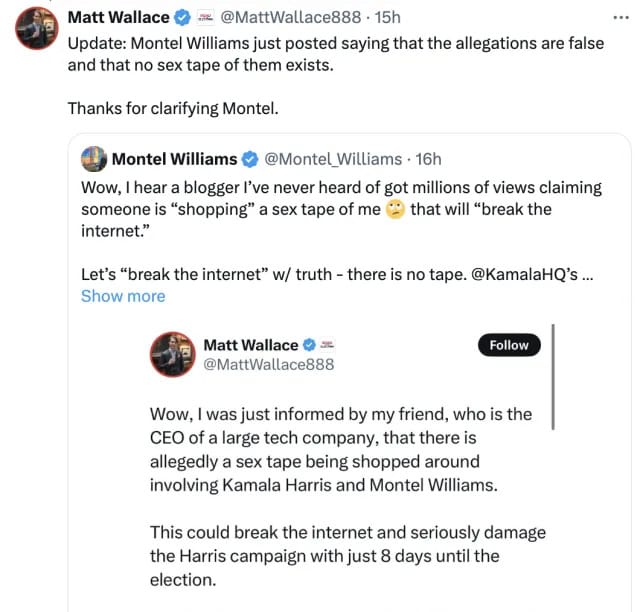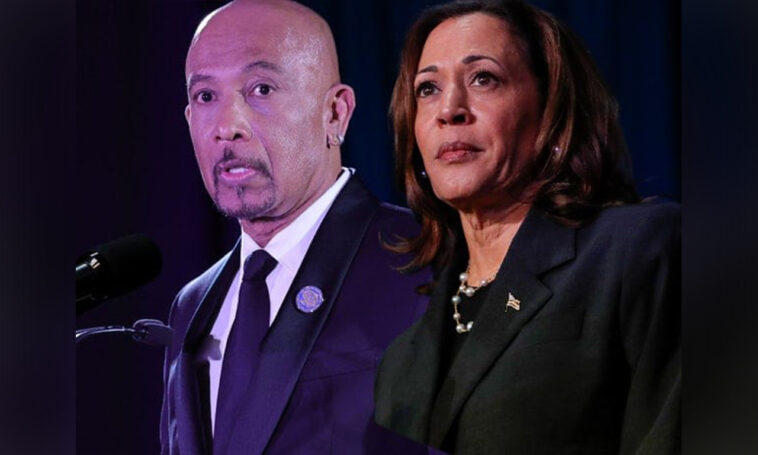Montel Williams, 68, has recently spoken out against unfounded rumors alleging the existence of a compromising video involving him and Vice President Kamala Harris. As Election Day draws near, with Vice President Harris facing a tight race against her Republican opponent, former President Donald Trump, rumors like these have gained attention online, potentially attempting to influence voters.The recent rumor was started by Trump supporter and YouTuber Matt Wallace, who claimed on October 28 that a “sex tape” involving Williams and Harris was being circulated and could impact the 2024 election. He tweeted,
“Wow, I was just informed by my friend, who is the CEO of a large tech company, that there is allegedly a sex tape being shopped around involving Kamala Harris and Montel Williams.”
This claim quickly went viral, with Wallace’s post gaining millions of views on X (formerly Twitter), sparking reactions and speculation among his followers. In response, Williams took to social media on October 30 to address these baseless allegations. He tweeted, “Wow, I hear a blogger I’ve never heard of got millions of views claiming someone is ‘shopping’ a sex tape of me that will ‘break the internet.’” Williams further clarified, “Let’s ‘break the internet’ truth – there is no tape By denying the allegations outright, Williams has pushed back against those who may be attempting to harm Harris’s campaign through scandalous and unfounded claims.
Following Williams’ statement, social media users criticized Wallace for promoting what they viewed as misinformation. Many of Harris’s supporters reacted with skepticism and frustration, mocking the accusation and calling it a desperate attempt to smear her reputation in the days leading up to the election. Comments ranged from disbelief over Wallace’s supposed “friend” to humorously questioning the feasibility of such a rumor. One person commented, “They’re desperate. We knew it was fake news. Who has a VHS player these days anyway?!”

Some users even suggested that Williams pursue legal action against Wallace for defamation. One commenter wrote, “That Matt guy better get ready for a lawsuit,” implying that spreading false and damaging rumors about someone’s personal life, especially when it involves public figures, could have legal consequences. As a measure to address misinformation, X has since added a Community Note to Wallace’s original post, indicating that Williams has denied any truth to the allegations.
Despite Wallace’s clarification in a follow-up tweet acknowledging that the claims were false, the damage had already been done, feeding into long-standing narratives perpetuated by far-right circles regarding Harris’s past. Similar stories have circulated for years, portraying Harris as someone who allegedly used relationships to advance her career. For instance, during her 2020 presidential campaign, an old clip from 2001 showing Harris with Williams and his daughter at an event resurfaced. At the time, some conservatives accused Harris of being Williams’ “side piece” under the incorrect assumption that his daughter was his wife. This assumption was later debunked, with Williams explaining that he and Harris had briefly dated years ago, long before she became a prominent figure in U.S. politics.
In an August 2019 tweet, Williams addressed the gossip surrounding their past relationship, writing, “Kamala Harris and I briefly dated about 20 years ago when we were both single. So what? I have great respect for Sen. Harris. I have to wonder if the same stories about her dating history would have been written if she were a male candidate.” His statement highlighted the double standards that female candidates often face compared to their male counterparts, especially regarding personal relationships.
In addition to these rumors, Harris has also faced false accusations related to her professional achievements. In particular, there have been unsubstantiated claims that Harris gained her position as San Francisco’s District Attorney in 2003 through an affair with then-mayor Willie Brown. This narrative has been weaponized by certain political groups seeking to undermine her credibility.
Public figures outside of politics have also joined the fray, further escalating these rumors. For example, former wrestling star Hulk Hogan recently made disparaging remarks about Harris, even going as far as insinuating that her political career was built on personal relationships. During an October 27 rally for Trump at Madison Square Garden, Hogan claimed that Harris’s public speaking sounded “like a script from Hollywood with a really bad actress.” Many interpreted his comments as allusions to inappropriate behavior, once again adding to the baseless rhetoric surrounding Harris.
Despite these continuous and unverified stories, Harris’s personal life remains focused on her marriage to Doug Emhoff, an intellectual property lawyer whom she met on a blind date in 2013. The couple married in 2014, blending their lives but maintaining a separation from the speculative narratives that often emerge around Harris. Emhoff has two adult children from his previous marriage, while he and Harris have no children together.
As the election nears, the spread of misinformation is a reminder of the challenges that public figures, especially female leaders, face in the digital age. Williams’ clear response to these rumors reinforces the importance of addressing misinformation head-on, but it also reflects a broader issue of how rumors, especially in the political sphere, can be used to distract and detract from critical national discussions.





Join the Community and Be a Part of the Conversation
You must be logged in or registered to post a comment.